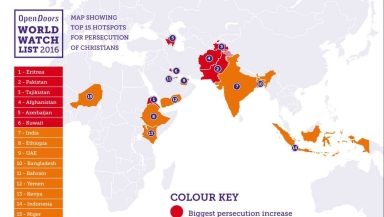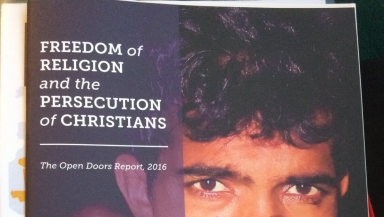Christians are under attack in large numbers around the world. There is a sliding scale of abuse from merely being 'second class citizens' through to torture and murder. This isn't a matter of debate. The cold hard fact is that when it comes to religious persecution, Christians are targeted in large numbers across the world.
In fact, one anti-persecution charity suggests 75 per cent of the persecution that affects people because of their faith is aimed at Christians. From North America, to India, from China to various parts of Africa, it's incredibly dangerous to be a Christian in public.
This week another charity dedicated to supporting persecuted believers, Open Doors, released its latest findings into persecution and concluded that "global persecution of Christians is more extreme than ever before." The data contained within the report would seem to back up what has been anecdotally evident. With the turmoil in Syria and Iraq adding to places where Christians have long been persecuted like Pakistan and China, the situation is dire.
So it was with some surprise I read a Nigerian Christian's critique of the figures. Writer Enuma Okoro's piece for the Guardian took issue with the way in which Open Doors extrapolated and interpreted its findings.
"Bare statistics don't communicate the full socioeconomic and political context," she said. "If we oversimplify the story of death and destruction happening far away, we risk desensitising and distancing people, which is the exact opposite of what reports such as Open Doors' set out to do."
Okoro was careful to point out that the violence Christians face in Nigeria and elsewhere is increasing. She says, "Yes, religious persecution is real and growing, in Nigeria as well as globally." However, she then seemed to undermine this by appending various caveats.
According to Okoro, Boko Haram (responsible for much of the violence against Christians in Nigeria) is, "a violent Islamic extremist group that, in part, fights what it sees as western ideologies and replaces them with its own belief system. But that doesn't make Christians the sole target of its terrorist activity." In other words, she claims it's too simple to suggest Christians are being killed just because they're Christians.

This is of course, true. Much like ISIS, Boko Haram is a group not merely content with killing Christians. It has marauded across parts of Cameroon, Niger and Chad as well as Nigeria. It's name means "Western Education is forbidden." Clearly, there are many instances in which Boko Haram has attacked moderate Muslims and those of other faiths. More Muslims have been attacked than Christians – a point made by Nigerian bishop Joseph Idowu-Fearon. Indeed, Boko Haram has attacked Mosques antithetical to its form of puritanical Sunni Islam.
But this doesn't deny the fact that they target followers of Jesus, simply because they're Christian. When Boko Haram attacks a church, it is doing so to victimise the Christians worshipping inside. The congregation is being attacked because it is Christian.
Of course, behind questions of religious conflict and persecution, there are often other issues. Tribal, ethnic or historic grudges can often be part of the cause. This needs to be acknowledged. Yet, if a part of someone's identity is that they and their family is Christian – then we can't merely say 'It's complicated.' We must acknowledge Christians are sometimes targeted just because they're Christians.
Okoro also suggests religious persecution around the world is "not just of Christians. It is important that we acknowledge and continue to track this, but we must also consider the nuances and context." This is another point which needs to be made, but can't be over-extrapolated.
The persecution of Rohingya Muslims in Myanmar is a dreadful case of extremism by a military regime causing untold grief and misery to a religious minority there. Muslims are persecuted because they are Muslims and their faith plays a part in their identity. Likewise, the oppression of Falun Gong followers in China, Yazidis under ISIS or of Baha'is in Iran is perpetrated on the basis of their religion – which may or may not be part of a wider ethnic identity.
Christians must be vocal in their opposition to this persecution of other faiths. If we want freedom for fellow Christians to worship around the world, we need to support it for all. Indeed, Christian leaders often are among those fighting for religious freedom for other groups.
However, just because other groups are sadly the victims of religious oppression, it doesn't mean we mustn't speak out loudly about the persecution of Christians, too. Christians in the Middle East for example, are facing what the Archbishop of Canterbury has described as the biggest threat to their existence since the invasion of Genghis Khan. Many have been killed, indeed beheaded and even crucified, simply for being Christian.
It doesn't diminish the suffering of Shia Muslims or other groups attacked by ISIS to highlight these dreadful attacks on Christians. By commemorating the extermination of Jews at the hands of the Nazis, we don't diminish the suffering of gypsies, gay people, Slavs, disabled people and other groups who also suffered terribly.
There's one final criticism lurking in Okoro's piece that speaks about the way in which data are interpreted. "I am dismayed by these statistics, but as a Christian living in Nigeria, I am surprised by them," she says. In this, she is pointing out a danger, but again probably extrapolating too far.

There is a legitimate debate on how we should interpret the data. Is it true or fair to say Christians are the most persecuted group in the world? Possibly. It's right to point out that we must never massage the figures to make it appear as if Christians are being uniquely affected – the real persecution many Christians endure is far too much, without us having to add to it.
There is a risk that statistics can be taken too far and used as a cynical tool to smear Muslims, or indeed for other political agendas. One example of this is the absurd suggestion that Christians in the UK or USA suffer 'persecution.' While there are some cases where Christians have suffered discrimination, to use the world 'persecution' and to suggest this is even vaguely similar to the violence and suffering Christians have suffered in countries like North Korea or Egypt is laughable.
There are Western groups who seem to imply that Islam is uniquely violent and oppressive. An extreme right-wing agenda can thrive on stories of Muslims abusing Christians. We mustn't use the persecution of our Christian sisters and brothers to suggest Muslims are some kind of unique threat to Western society. However, we mustn't swing to the opposite extreme either – and imply that persecution of Christians is only a small problem or merely one problem among many. It is a vast issue, and I'm grateful to Open Doors for its tireless work in highlighting it.















